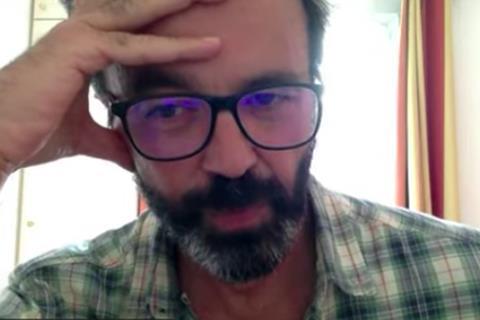
The Senegal-born, Lebanese director Ghassan Salhab is a mentor in the Doha Film Institute’s annual project incubator Qumra (March 18-25), alongside Syrian documentarian Talal Derki, Moroccan filmmaker Tala Hadid and Palestinian director Annemarie Jacir.
The veteran director, who belongs to a generation of Lebanese filmmakers that began to emerge in the late 1990s as their country rebuilt following its bloody 1975 to 1990 sectarian war, describes himself as self-taught.
“I didn’t go to film school. I was born in 1958 and film schools didn’t exist in Lebanon when I was growing up. There weren’t even film courses at university” he says.
”Like many cineastes, I learned through watching films. I had a rich palate and still do. I love radical, independent cinema but I’m also happy to go to see the latest Batman.”
“Having started out as a spectator, I realised that cinema wasn’t just something I loved, it was also something I was passionate about. I got into making films bit by bit, working with other people on their shorts and features. I also discovered I had a capacity to be very analytical and structured in terms of my writing and I ended up working a lot as a co-writer.”
Phantom debut
Tapping into the human impact of Lebanon’s Civil War, Salhab’s 1998 debut feature Phantom Beirut revolved around a man who returns to Lebanon in the late 1980s, years after he took advantage of the confusion of the conflict to pretend he was dead.
“I’d made short films, but you can get blocked at the short film stage if you’re not careful. This film marked a turning point for me. It may seem strange, but I discovered myself and found that I had the capacity to pull off a feature. It’s not something you can understand when you work on other people’s films. It was difficult to finance, and I also shot it on 16mm. It required stamina and patience as I would have to wait months at a time for funding to come through. I began it in 1995 and finally finished it in 1998.”
In spite of the struggle to get the film off the ground, Salhab suggests the situation was still easier for an emerging filmmaker in the 1990s than today.
“There weren’t so many doors to knock on for finance but there were fewer films, and the process was relatively straightforward. You wrote a screenplay and you either got it financed, or you didn’t,” he says. “I’m not sure I’d like to be in the place of young filmmakers today. They need to jump through so many hoops at the development stage. I’m not sure I would have been able to stomach it, I am too independently minded.”
“I try to listen”
This independent spirit shines through in Salhab’s approach to his role as a Qumra mentor.
“I don’t tell people what to do or how their project should be,” he says. “I’ve never understood how people could dare do that. I always feel it’s an insult to someone’s intelligence and terrible. I was born in Senegal and there is a saying there, “You can’t turn a monkey into a lion.” What does that mean? It means that you can’t turn somebody into something they’re not. It’s the same with a project. I try to listen to the filmmaker and help them find their own path.”
Salhab recently completed his trilogy exploring the Lebanese collective psyche, comprising The Mountain, The Valley and lastly The River, which debuted at Locarno’s international competition in 2021. He is now in the early stages of development on a new feature entitled The Last City. He describes it as a spin-off of his 2006 third feature The Last Man about a solitary Beirut doctor with a secret life as a vampire.
The project reunites Salhab with producer Tania El Khoury who produced The River. (El Khoury is also producing Anas Khalaf’s Love-45). “It will be my first film shot in Berlin for a while. It will be a suspenseful, sci-fi, vampire film. We’ve recently submitted it to France’s Aide aux Cinémas du Monde and we’ll see what comes out of that.”
























No comments yet